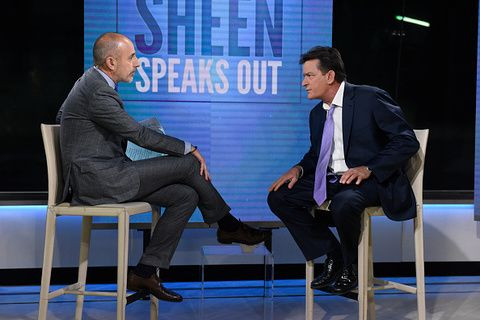Charlie Sheen HIV Disclosure Linked To A Spike In Google Searches, Boosting Public Awareness

What was the emotional price paid by Charlie Sheen when he revealed his HIV status on national TV last November? No matter the cost, he might take comfort in the fact that his disclosure may do a world of good, suggest San Diego State University researchers. The greatest number of HIV-related Google searches ever recorded in the United States occurred the day Charlie Sheen told the world he was HIV positive, their new study finds.
“Just as with celebrities Rock Hudson’s and Magic Johnson’s disclosures of their HIV-positive status, Sheen’s disclosure may be similarly reinvigorating awareness and prevention of HIV,” concluded Dr. John W. Ayers, a professor of public health, and his co-authors.
Why is HIV a bigger problem than Syphilis, say?
HIV is a virus (human immunodeficiency virus) that attacks your body’s immune system and so makes it difficult for you to fight off infections. Unlike some bugs, your body cannot get rid of HIV completely, so once you are infected, you have it for life. If you do not get treated for HIV, the virus can destroy so many immune cells in your body, you will not be able to fight off infections and disease. These “opportunistic” illnesses are the sign that you have developed AIDS (acquired immunodeficiency syndrome), the final stage of HIV infection.
Currently, scientists have not figured out a way to cure HIV. The good news? Treatment and medical care can control HIV, prolong your life, and also lower your chance of transmitting HIV to others. In fact, people on treatment can live nearly as long as someone who does not have this bug.
Am I Really at Risk?
More than 1.2 million people in the U.S. are living with HIV, yet nearly one in eight do not know they are infected. Sex is the most likely way to become infected. The group of people most likely to become infected are gay and other men who have sex with men. Although men who have sex with men represent only 4 percent of the total male population in the U.S., they accounted for 63 percent of all new HIV infections in 2010, according to the Centers for Disease Control and Prevention.
White men who are gay or bisexual account for the largest number of new HIV infections (11,200 in 2010), followed closely by black men having sex with other men (10,600 in 2010). Among men who have sex with men, young men are the most vulnerable, with black men between the ages of 13 and 24, in particular, accounting for a high proportion of new infections (4,800 in 2010).
What Steps Should I Take Now?
To find the nearest location to get tested, click here and simply fill in your zip code. If you find, like Charlie Sheen, you are positive, you can begin receiving treatment. If you find you are HIV negative, you can learn how to prevent infection.
You are most likely to become infected if you have sex without using a condom or without taking preventative medicine. Anal sex is the riskiest type of sex for getting HIV. Vaginal sex is less risky but the virus can still be transmitted in this way. Oral sex exposes you to little or even no risk of the bug. Finally, the number of sex partners you have affects your risk. People with many partners are more likely to stumble across someone with HIV.
Condoms are effective in preventing HIV — but only if you use them consistently and correctly. Pre-exposure prophylaxis (PrEP) is another way to prevent HIV infection, but this requires you to take a pill every day.
For more information about HIV, please click here. Now, back to Charlie Sheen.
Winning Hearts and Minds
To understand the impact of Sheen's disclosure, the authors of the study gathered Internet searches for four categories: HIV, condoms, HIV symptoms, and HIV testing. News reports about HIV decreased from 67 stories per every 1,000 in 2004 to just 12 stories per every 1,000 in 2015, the authors discovered. However, the day Sheen told the world he was HIV positive, a 265-percent spike occurred. As a result, Sheen’s day of disclosure ranks among the top 1 percent of HIV-related media days in the past seven years, the authors report.
By another count, Sheen's confession proved even more of a winner; it corresponded to the greatest number of HIV-related Google searches ever recorded in U.S. history. For this reason, the authors say some effort should be made “to leverage the ‘Charlie Sheen effect.’”
“Sheen’s disclosure may benefit public health by helping many people learn more about HIV infection and prevention,” concluded the authors. “More must be done to make this benefit larger and lasting.” As they say, let it begin with you: Learn more and get tested.
Source: Ayers JW, Althouse BM, Dredze M, Leas EC, Noar sM. News and Internet Searches About Human Immunodeficiency Virus After Charlie Sheen’s Disclosure. JAMA Internal Medicine. 2016.



























